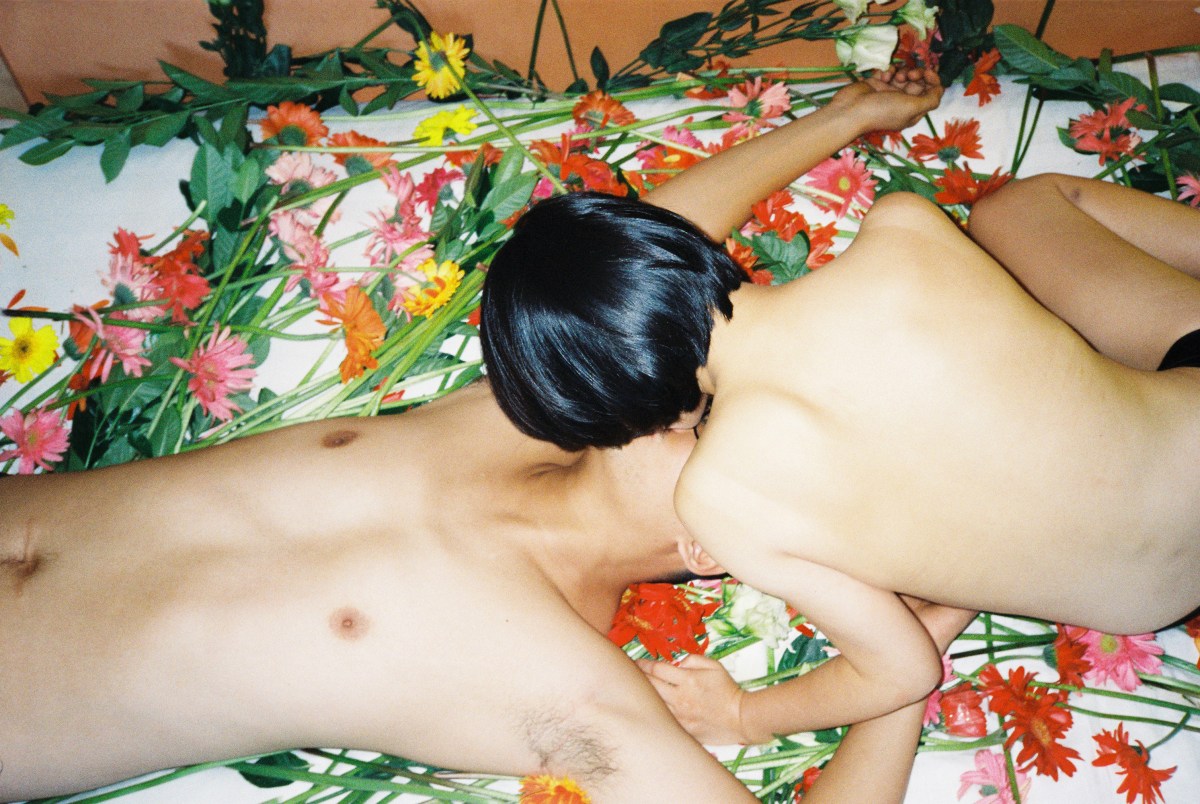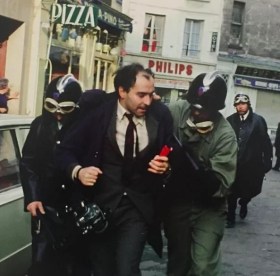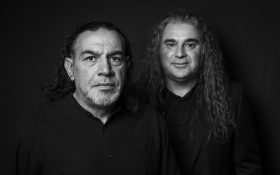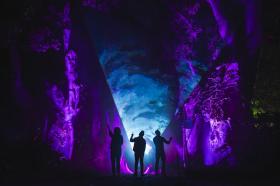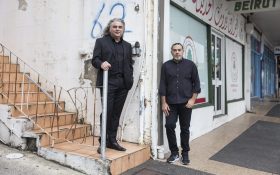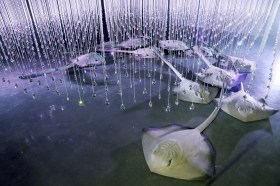I have not loved (enough or worked) focuses on how bodies and lives intersect with spaces and structures. Named after a reworked line of a Lisa Robertson poem, this intoxicating exhibition speaks of embodiment, relationships and finite experience through the artworks of eight insightful artists.
Tao Hui’s Hello Finale! (2017) installation consists of nine videos playing simultaneously in a three-by-three grid formation of screens. Each screen has its own chair-and-headphone set. Observing these experimental narratives feels like eavesdropping on nine private telephone calls. A student at school, a child walking and a mourner at a cemetery feature among the phone-based monologues, all of which are scripted in Japanese, with two sets of subtitles. Novel and engaging, this 40-minute video installation asks the audience to question their own implicit assumptions and default expectations.
A anticlockwise exploration of the exhibition will lead from Hui’s installation to large-scale prints from Pixy Liao’s ongoing photography project, Experimental Relationship (2007 – ongoing), which plays with relationship power dynamics. Liao takes photographs of herself and her boyfriend in order to convey their personal experiences with subverting traditional gender roles in terms of age, authority and choice.
Each print is composed to communicate Liao’s dominance, but there are subtle threads of pressure woven throughout these representations of female empowerment. For example, After Psyche Revived by Cupid’s Kiss (2019, digital print) features Liao on a chair by an open window, barefoot, with her prostrate partner positioned face down over her lap. Liao’s hand is raised above her boyfriend’s bare behind, holding the camera’s shutter button. Is this an act of punishment, an expression of power or something else entirely? Liao’s boyfriend may be submissive in his pose and exposure, but Liao must carry the burden of his weight.
This concept of power in relation to effort is repeated more literally in It’s never been easy to carry you (2013, digital print), in which Liao’s partner is draped around her shoulders, and more humorously in How to build a relationship with layered meanings (2008, digital print) in which Liao lays naked on a stack of mattresses, with her equally naked partner laying facedown on top of her. This causes a noticeable bowing of the mattress stack, leading the audience to search for a figurative fulcrum in this metaphoric balance of power. Liao experiments intimately with non-traditional relationship dynamics in her captivating compositions.
Moving to the far right wall of the exhibition space, Rinko Kawauchi’s poetic prints are smaller and more numerous than Liao’s, but no less powerful. Kawauchi’s heartfelt photographic captures are displayed in matching frames, repeating in a long line across the wall like an optical illusion. Newborn babies, family portraits, the wringing-out of dirty cloths and pale floral close-ups appear one after another, deeply personal representations of emotion and everyday life.
The next section is dominated by Lin Zhipeng’s (aka No.223) archival pigment prints. Depicting bodies in various states of undress – some of which are frozen in unusual poses – No.223 brings private moments into public focus, rebelling against the conservative nature of Chinese society. Three-way kisses (Clover, 2007), naked joyrides (Riding at Night, 2009) and milk-water floating (Couple, 2016) exude a sensuality both playful and serious, while the compelling contortions of Top of Lily (2010) and Grand Amour, Meimei’s Flying (2018) demand subsequent examinations by virtue of sheer aesthetic oddity.
Daisuke Kosugi’s 2019 sculpture, To hold on hold, uses bamboo, steel, rubber, plastic, a mop and concrete slabs to comment on the fragility, strength and ambiguity of the human form. His Recliner (2019, bamboo, steel, plastic strips, pine tree) is a confusing and uncomfortable take on resting furniture.
Kosugi, who works with film in addition to sculpture, explores empathy, architecture and the human form in his 50-minute 4K video, A False Weight (2019). This three-act narrative is impressively choreographed by Butoh dancer, Toru Iwashita, who plays a Japanese bodybuilder/architect struggling with issues surrounding freedom and autonomy. Nearby, Lieko Shiga’s monochromatic and heavily saturated Blind Date photographic series (digital print, 2009) is an exercise in shared looking, consisting of couples on motorbikes in Bangkok.
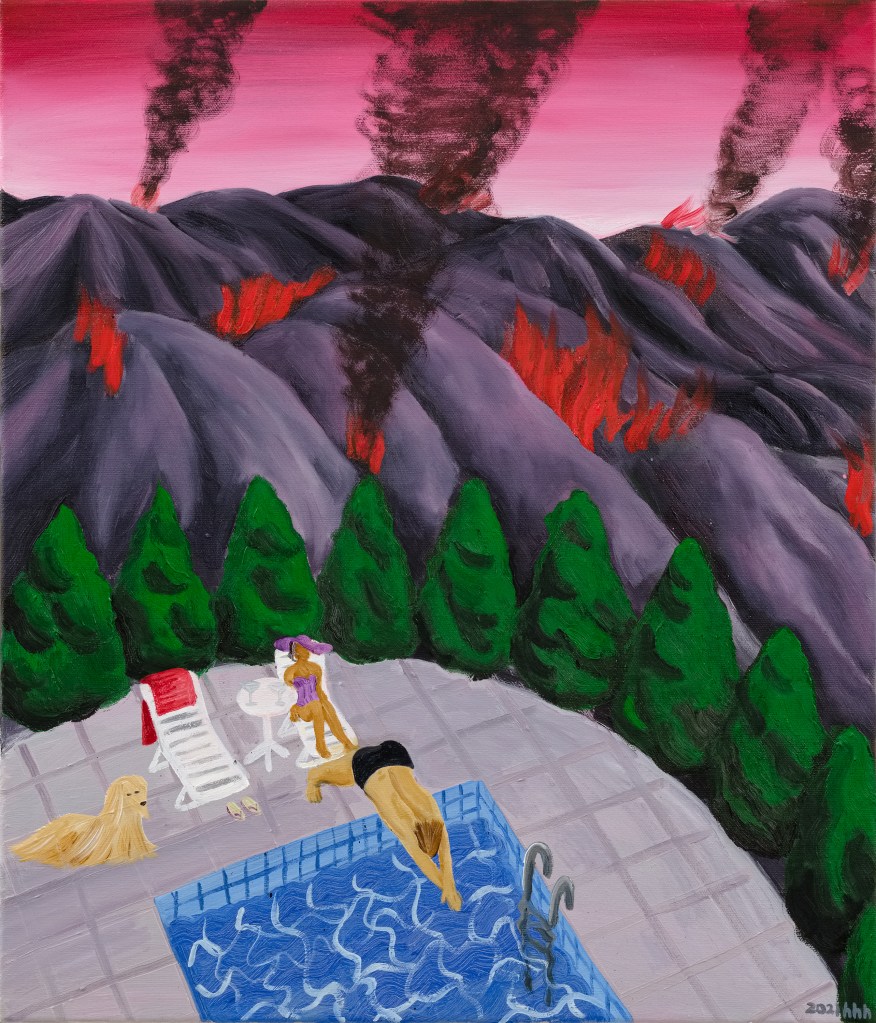
Hai-Hsin Huang’s satire of the mundane combines colour, humour and an underlying sense of dread to comment on pandemic life. Her seven oil on canvas works contain contradictions and spirited expressions of frustrated existence. Mayday Blues #3 (2021) is heavy in yellow, depicting a person walking through a crowd, alone in their need from protection against the elements.
The Future is Hot # 6 (2021, oil on canvas) reveals a world on fire, with the flames and smoke stacks ignored by those who would rather luxuriate poolside. The sun changes position and the foreground is interchangeable, but the landscapes in Huang’s paintings are intentionally connected. Whether flying a kite from the top of a building (The Future is Hot #1, 2021, oil on canvas) or crying into a piano (The Future is Hot #4, 2021, oil on canvas) this series could be commenting on inequality, apathy, absurdity, delusion or all of the above. Huang’s vivid artworks speak of shifts in societal values, and the subsequent restructuring of socially constructed meaning.
Read: Exhibition review: Dreamhome: Stories of Art and Shelter
I have not loved (enough or worked) is a testament to the collective creative prowess of Hai-Hsin Huang, Daisuke Kosugi, Pixy Liao, Lin Zhipeng (aka No.223), Rinko Kawauchi, Sejin Kim, Lieko Shiga, Tao Hui and Rachel Cieśla. An hour isn’t long enough to appreciate the scope of this beautifully curated collection of photography, painting, film and sculpture. This exhibition will resonate with those who have not loved enough (or worked) and those who have.
I have not loved (enough or worked)
Art Gallery of Western Australia
Curated by Rachel Cieśla
Artists: Hai-Hsin Huang, Daisuke Kosugi, Pixy Liao, Lin Zhipeng (aka No.223), Rinko Kawauchi, Sejin Kim, Lieko Shiga, Tao Hui
Free admission
I have not loved (enough or worked) will be on display until 23 April 2023
